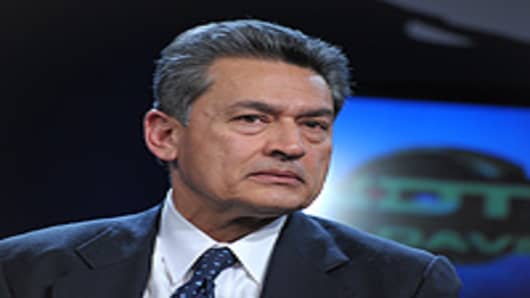Despite pressure from federal prosecutors overseeing the case against Raj Rajaratnam, the Securities and Exchange Commission pushed ahead with its insider trading case against Rajat Gupta because of his status as a sitting board member on public companies.
In late February, the SEC enforcement division found itself at odds with prosecutors in the US Attorney's office for the Southern District of New York over what to do about Gupta, the former head of the consulting firm McKinsey & Co who was then sitting on the boards of Procter & Gamble and American Airline's parent company AMR .
Both groups believed that Gupta had passed on insider information that he obtained as a member of the boards of P&G and Goldman Sachs (he had resigned from Goldman's board a year earlier). But the US Attorney's office was focused on the upcoming criminal trial of Rajaratnam, which was set to begin on March 8th.
They worried that charging Gupta so close to the start of the Rajaratnam trial could be a distraction and possibly leave prosecutors open to charges that the publicity generated from making the charges had biased the jury pool.
What's more, the U.S. Attorney's office believed that criminal charges against Gupta would be easier to prove once they had obtained a conviction in the Rajaratnam trial. After all, if Rajaratnam were to be found to have been guilty beyond a reasonable doubt of trading on information given to him by Gupta, the case against Gupta would be easier to prove.
The SEC, however, was concerned about Gupta's continuing role as a board member of P&G and AMR. There had been some hope among investigators that Gupta would step down—or be asked to resign—after the SEC delivered a Wells Notice letting Gupta know that that investigators in the Galleon case were looking into his role. Gupta did step down from Goldman's board last spring, but remained on the boards of P&G and AMR. From the SEC's point of view, this made him a continuing threat to shareholders of those companies.
When Gupta responded to the Wells Notice in February, his response raised additional red flags with investigators at the SEC. The evidence that Gupta seemed willing to provide was friendly toward Rajaratnam, according to a person familiar with the matter who is not at the SEC. The SEC, which views Rajaratnam a thoroughly bad guy, viewed this as an alarming development, according to a person familiar with the thinking inside the SEC. From their point of view, Gupta was continuing as a co-conspirator with Rajartnam. They were determined to take action quickly.
In the end, it seems a compromise was reached between the SEC and the US Attorneys. The SEC would bring a civil suit against Gupta, which it was confident would result in his removal from the corporate boards. This would satisfy the SEC's desire to put an end to what the commission believes was an on-going danger to shareholders. The US Attorneys would hold back on charges, although they would name Gupta as a "co-conspirator" in open court.
The SEC and US Attorneys office declined to comment for this story. Gupta's lawyers have said their client is innocent of wrong-doing. Rajaratnam pleaded innocent to the charges against him.
_____________________________________
Questions? Comments? Email us atNetNet@cnbc.com
Follow John on Twitter @ twitter.com/Carney
Follow NetNet on Twitter @ twitter.com/CNBCnetnet
Facebook us @ www.facebook.com/NetNetCNBC



